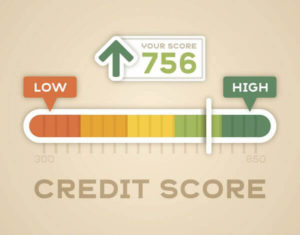1. Not Knowing or Monitoring Your Credit Score
 Many first-time or inexperienced homebuyers don’t realize the impact their credit score can have on all aspects of their life, and in particular trying to qualify for a mortgage with a good interest rate. Ultimately, the higher the borrower’s credit score is, the higher the likelihood of getting pre-approved for a loan at a low interest rate.
Many first-time or inexperienced homebuyers don’t realize the impact their credit score can have on all aspects of their life, and in particular trying to qualify for a mortgage with a good interest rate. Ultimately, the higher the borrower’s credit score is, the higher the likelihood of getting pre-approved for a loan at a low interest rate.
During the pre-approval process we will run a credit report for you, but that doesn’t mean you shouldn’t know what your range is. There are plenty of online platforms that keep you up to date on your credit score at no cost and with no impact to your score.
Not being up-to-date on your credit score and not knowing what is included in your credit report can really set you back during the home loan and purchase process, as you may be forced to clean up, resolve, or dispute items on your credit report during the loan approval process.
Realistically, you are better off looking into your credit and starting to resolve any credit issues prior to trying to get pre-qualified for a home loan. This will ensure you will be ready to go when it’s time to go house shopping and do not lose the home of your dreams because of a delay in receiving loan approval due to credit issues.
Of course, at Price Mortgage we would be happy to work with you even if the issues don’t come up until you apply for a loan.
2. Not Getting Pre-Approved
Getting pre-approved is very important for any homebuyer as it can save you a lot of heartbreak and frustration later on by ensuring you know exactly how much house you can afford as you enter your home search.
Imagine the disappointment of falling in love with a house you think you can afford, only to realize it is just beyond reach following a conversation with your lender.
To get pre-approved you will need to fill out an online application, any lender that says differently is not being upfront with you. Pre-approval, in addition to giving you peace of mind regarding what you can afford, can also give you an advantage over other bidders if you end up making an offer on a house with multiple bidders. Knowing that you have already qualified for the loan amount it will take to purchase their home makes a favorable impression on any seller weighing their options.
3. Not Budgeting For Closing Costs

- Lender fees (Price Mortgage doesn’t charge any lender fees!)
- Inspection costs (requested by you or your lender)
- Appraisal fee
- Title insurance
- Escrow deposit
- Pest control inspection fee
- Recording fee
Make sure that you review your good faith estimate (GFE) provided by your lender after you apply for a loan. The GFE is an estimate of what closing costs on your home can look like, and it is a good way for you to budget for your closing costs in order to not get caught off guard later on in the process.
4. Not Creating a Long-term Budget Plan and Considering Other Hidden Fees and Costs
Borrowers know that as part of their mortgage, they are obligated to pay back their loan in the form of monthly mortgage principal, interest, tax, and insurance payments, which they have budgeted for. However, they often do not figure other monthly expenses, such as car payments, health insurance, utility, cell phone, gas and grocery bills, in addition to unexpected costs, such as a storm-damaged roof, a broken refrigerator, or a clogged toilet, into the long-term budget equation.
It is important for you to gain a better understanding of what your monthly income is and what your expenses will be, both expected and unexpected.
This is especially pivotal if you have never owned a home before and are unfamiliar with all the costs that will come your way as a homeowner. During the loan approval process, your lender will work on calculating your debt to income ratio to dictate how much money you qualify for. But, from the very beginning of the loan process, as you choose your lender and start searching the real estate listings in your price range, you should ensure that you are comfortable with your estimated monthly mortgage payments and have factored in padding for those hidden or unexpected costs that are bound to come up.
5. Not Taking The Time to Research All Your Options
As any previous home buyer will attest, buying a home is often not a quick and easy process, especially for first-time homebuyers. Of course, we always strive for a smooth loan process and to close on-time or early. You will be spending a lot of time speaking with your loan officer throughout the home loan process, which makes it imperative that you can communicate well in order to keep the process moving forward.
As you research lenders and review your available options, consider if a lender is referred by a friend, has great ratings and client testimonials online, makes a great first impression, and how much fees they charge.
The lender you choose should be committed to excellence in customer service from the very first email or phone call. If you have a hard time getting a call back, or an answer to a question early on, chances are this lender’s communication won’t improve much later on. You need to ensure that your lender becomes your personal mortgage planning specialist, who works with you to make sure your needs are met and your dream of homeownership is realized.
Not Sure Where To Start?
That's okay. Let us build a custom loan program around your needs and budget.
Contact Us